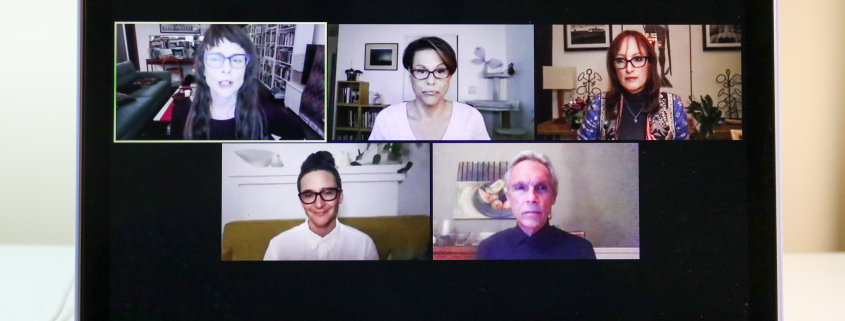“Disclosure” continues to inspire discussions of trans lives on and off screen

Eighty percent of Americans don’t personally know a transgender person, so their entire perception of the transgender life comes from what they see in the media: This is the issue that the documentary “Disclosure” explores in depth.
USC’s Visions and Voices held a screening of the documentary Wednesday, followed by a virtual discussion with filmmakers to further examine how the depiction of transgender people in the media impacts the public’s understanding of their lives off-screen.
The discussion included “Disclosure” Director Sam Feder, as well as Jen Richards, a writer and actress who appears in the documentary and Alexandra Billings, an actress and professor at the USC School of Dramatic Arts, who also appears in the film. The conversation was moderated by Michael Renov, the vice dean for Academic Affairs at the USC School of Cinematic Arts.
The conversation began by discussing the process of making the film, which premiered at Sundance last year and was released on Netflix June 19. Feder said that instead of presenting the film as a chronological history of transgender depictions in media, he wanted to structure it in a way that inspired change in the viewer.
The documentary featured several interviews with notable transgender actors and creators in the film industry, such as Laverne Cox, Mj Rodriguez, Brian Michael Smith and Lilly Wachowski discussing their views on various portrayals of transgender characters in film and television. These portrayals affected their own views of their identities because popular depictions of transgender characters as villains, comic relief or deceptive tricksters caused them to see themselves negatively. Many of the interviewees on “Disclosure” also touched on how they broke into the entertainment industry and how the roles they have been offered have changed over time.
Feder explained how he saw these sections of the film as more than just interviews, saying “we’re seeing these people come to realizations in real time, processing information, remembering something they hadn’t thought about in decades.”
Richards pointed out that while Feder is never actually seen in the film, an important element of the interviewees is that each of them was having these conversations with him and that the filming was a collaborative process. Billings added that the most important part of making the film was the creation of a familial space.
“We could recognize and remind […]each other that not only are we here, but that we will continue to be here,” Billings said.
When asked about his collaborators on the film, Feder stressed the importance of working with transgender filmmakers. He prioritized hiring and mentoring transgender people throughout the production process and responded to critics who told him he should focus on hiring “the best” people by saying “trans people are the best people for this film.”
He worked with several executive producers that represented the transgender community in Hollywood, including Cox, and stressed the importance of working with others that share your vision.
“I finally understand that you have to build your team,” he said.
Audience member Rui Machida asked the panelists whether they think stories about transgender people should only be made by transgender people. Richards responded by saying that she has struggled with similar issues in her own writing. She offered the advice that any cisgendered person who wants to tell a transgender story should involve multiple transgender people in the process, and make sure that they understand the history of transgender stereotypes so that they don’t perpetuate them.
Billings drove the point home by asking a simple question: “Think about how you want to be treated. If someone’s telling your story, how would you want to be represented?”
Toward the end of the discussion, professor Renov asked the panelists about what they think the film’s impact has been so far. Billings brought up that her followers on TikTok have learned about her transgender identity from the film, and even though they spam her with somewhat discriminatory comments, she is happy to know that they have watched the film and started the process of learning to accept transgender people.
“Even though it’s transphobic and it’s awful and it can be triggering, it shows me that there is a change in the air,” she said.
Richards stated that she was brought onto the creative team behind “Clarice,” a new TV spin-off of “Silence of the Lambs,” because the creators wanted to create a role for a transgender character that would correct the mistakes of the original film, which depicted a violent transgender serial killer. A few days before Wednesday’s panel, it was announced that Richards would play the role she helped create. Richards believes this will be one of the direct impacts of “Disclosure,” showing how the film industry is already taking steps to change.
“We’re starting at a different point in the conversation that allows us to go so much further,” she said.
Feder agreed with Billings and Richards and said that the greatest impact of the film is beyond the fact that it inspires empathy.
“We have this idea of empathy, and empathy is great, but what is empathy without action?” he asked, going on to describe how his film has been used in workplaces and courtrooms to educate about biases against transgender people, creating real change in the off-screen lives of the transgender community.
“I never imagined not only how quickly it seemed to have an impact, but how vast it’s been,” he said. “To see that people are feeling a sense of empathy and connection and then taking action after that is mind-blowing.”

